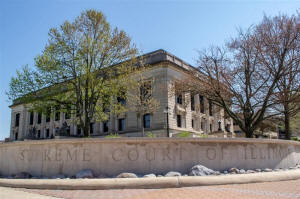State auditor general’s campaign committee violated election law, court
finds
 Send a link to a friend
Send a link to a friend
[May 21, 2021]
By SARAH MANSUR
Capitol News Illinois
smansur@capitolnewsillinois.com
 SPRINGFIELD — The campaign committee of
former state Rep. Frank Mautino, who is now the Illinois auditor
general, violated state law when it spent campaign funds on gas and car
repairs for personal vehicles, the Illinois Supreme Court decided
Thursday. SPRINGFIELD — The campaign committee of
former state Rep. Frank Mautino, who is now the Illinois auditor
general, violated state law when it spent campaign funds on gas and car
repairs for personal vehicles, the Illinois Supreme Court decided
Thursday.
But the court did not find Mautino’s committee violated a separate
section of state election law that prohibits spending more than fair
market value for goods and services.
However, since Mautino’s committee was dissolved in 2015, any fines
levied against it would likely not be collected, a spokesperson for the
Illinois State Board of Elections said Thursday.
The case against Mautino’s campaign committee dates back to early 2016
when Mautino resigned from his position as a state representative, after
25 years in the General Assembly, and was appointed auditor general.

Illinois resident David Cooke filed a complaint against Mautino’s
campaign committee with the State Board of Elections in February 2016.
Specifically, Cooke argued the committee’s expenditure of more than
$225,000 on gas and repairs at Happy’s Super Service for personal
vehicles violated section 9-8.10(a)(9) of the Act to Regulate Campaign
Financing. He also claimed the committee’s spending at Spring Valley
City Bank for travel expenses violated section 9-8.10(a)(2).
Section 9-8.10(a)(2) of the Act bans political committees from spending
campaign funds on items or services that are more than “fair market
value.” Section 9-8.10(a)(9) provides that if a committee does not own
or lease the vehicle, it can spend campaign funds only on reimbursements
for mileage expenses.
Cooke also alleged the committee’s documentation regarding the Spring
Valley City Bank was improper, and the committee’s inadequate disclosure
reports willfully violated the law.
In May 2016, ISBE ordered the committee to file amended disclosure
reports, but the committee failed to do so, leading ISBE to determine it
willfully violated the law. While the committee had destroyed its
pre-2014 records according to statute when it dissolved, it did possess
records for 2014 and 2015, the board found.
The board imposed a $5,000 fee on the committee but did not address the
merits of Cooke’s complaint. Cooke appealed to the state appellate
court, which sent the case back to ISBE for a decision on the merits.
In July 2018, ISBE decided the committee did not violate any sections of
the act and Cooke again appealed. In its second hearing of the case, the
appellate court reversed ISBE’s decision and ruled that the committee
violated the law when it came to travel and vehicle expenses.
The committee appealed to the Illinois Supreme Court, and the justices
agreed that the committee’s spending on gas and repairs for vehicles
that were not owned or leased by the committee was in violation of the
law.
“(W)ith regard to a vehicle neither owned nor leased by a committee, the
committee may only make expenditures for actual mileage reimbursement
when that vehicle is used for campaign or governmental purposes,”
Illinois Supreme Court Justice Rita Garman wrote in the 28-page opinion.
[to top of second column]
|

Illinois Supreme Court building in Springfield.
(Capitol News Illinois file photo)

But the justices disagreed with the appellate court
on its decision that the committee’s expenditures for travel and
vehicle expenses violated the law in regard to their relation to
fair market value.
“Cooke did not present evidence demonstrating that, for example, the
price per gallon paid by the Committee clearly exceeded the market
price on the relevant date,” Garman wrote.
On the spending at the bank, the justices found that Cooke could not
“compare the amount of money withdrawn from the bank with the travel
costs Mautino purportedly incurred,” because the committee refused
to amend its disclosure reports to identify the specific purpose of
the bank spending.
“Instead, Cooke could only demonstrate the peculiarity of the (c)ommittee
and Mautino’s method of reporting expenditures for certain travel
expenses. Therefore, the Board was without the requisite information
to determine whether it was more probably true than not that the
Committee violated section 9- 8.10(a)(2),” Garman wrote.
The justices ordered that the case return to ISBE, which will decide
whether the committee “knowingly” violated the law with its spending
on gas and car repairs.

Matt Dietrich, spokesperson for ISBE, said the board could add
another fine for the committee, although it no longer exists.
“Because our Board is empowered only to impose and collect fines
against/from committees, not individuals, there is no mechanism for
obtaining payment from a committee that no longer exists,” Dietrich
said in email. “The only leverage we have for getting payment in
such cases is when a candidate later decides to run for office and
still has old fines on the books. A candidate can't get on the
ballot in Illinois if they have unpaid fines. We can refer those
unpaid fines to the Attorney General's Office for collection.
However, they'd also be faced with attempting to collect from an
entity that has not existed for more than five years.”
In an emailed statement, Mautino said he is pleased with the
decision today by the Illinois Supreme Court and looks forward to
finalizing the matter.
A representative for the right-leaning Liberty Justice Center, which
provided legal representation for David Cooke, did not respond to a
request for comment.
Capitol News Illinois is a nonprofit, nonpartisan
news service covering state government and distributed to more than
400 newspapers statewide. It is funded primarily by the Illinois
Press Foundation and the Robert R. McCormick Foundation. |